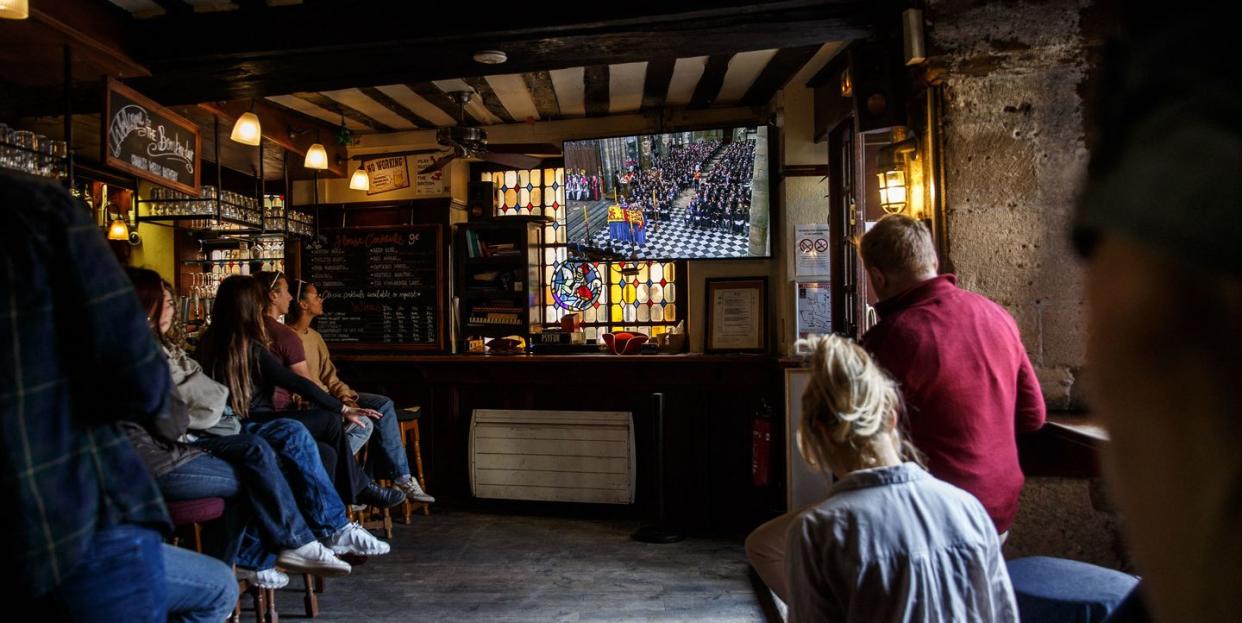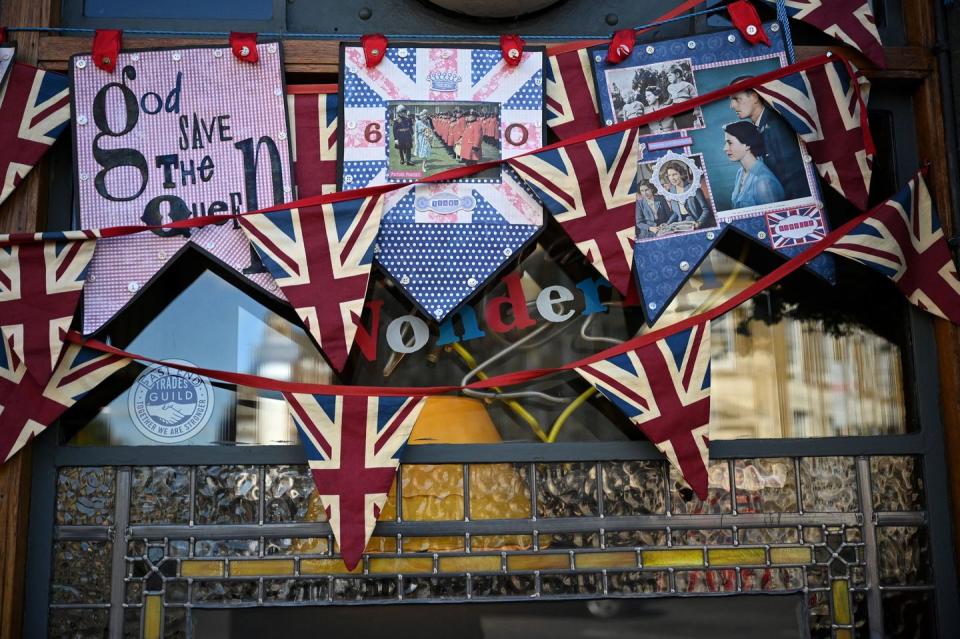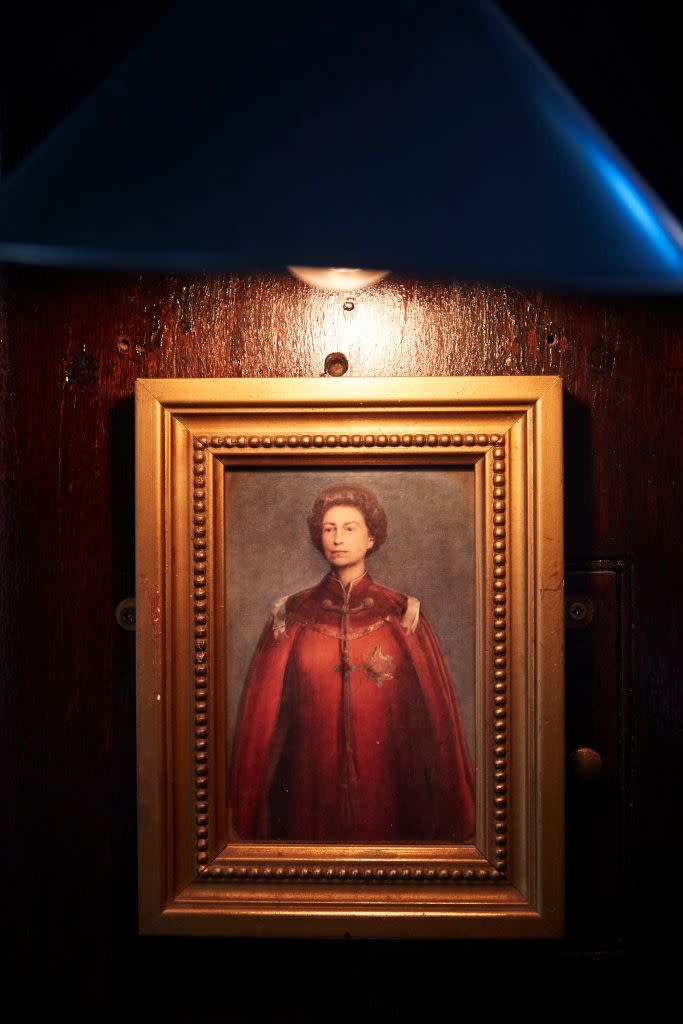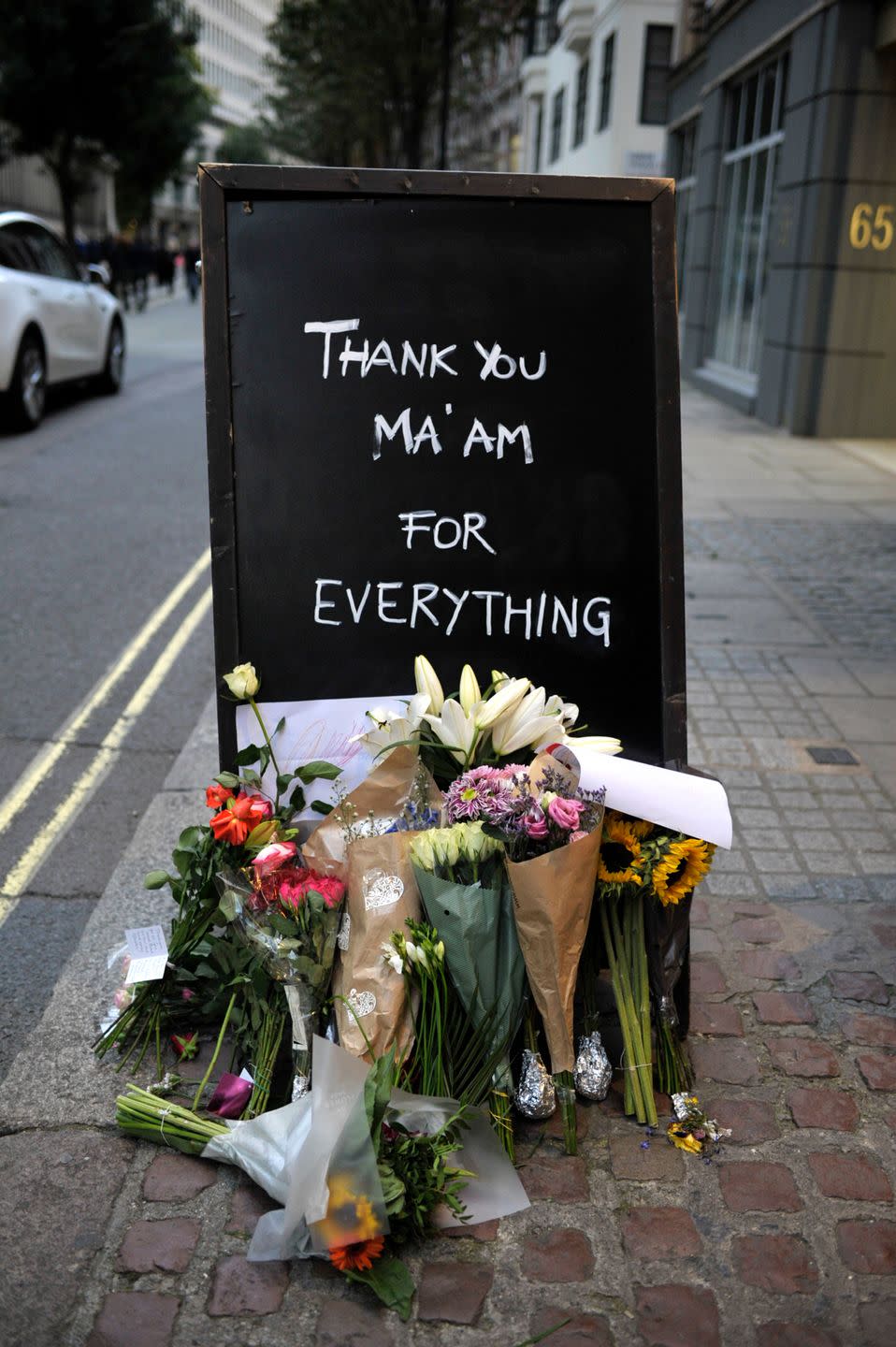They Watched the Queen’s Funeral from a Pub

Just after 8 a.m. Monday morning at the Montagu Pyke, along Charing Cross Road near Leicester Square, in central London, a solitary gin and tonic sat unattended at the front of the bar, like a stoup of holy water. Beads of condensation collected on the glass. No one touched it.
For millennia, loyal acolytes of both gods and monarchs have shown deference by bowing their heads, but across Britain on Monday morning Queen Elizabeth II’s subjects raised their heads to screens in pubs, the temples of British daily life. At the same moment the Montagu Pyke was opening its doors—three hours earlier than usual—the doors of Westminster Abbey creaked open to allow entry to congregants at the funeral of Queen Elizabeth II.
The pub had a large, pull-down screen in the back, and five flatscreen televisions mounted on the walls. Several dozen people sat watching the ceremony for more than four hours. When they spoke—to order a tea or, in most cases, a pint of ale—it was in a whisper. The voices of the BBC commentators filled the pub’s main atrium. (It was built in 1911 as a cinema and later converted to a live jazz venue. The acoustics are excellent.)

“It feels unfair, doesn’t it?” said Michael Ashford, 81, who sat alone in a simple black suit and tie, dulled and crumpled medals hanging on his lapel. “Seventy years of service and, really, I’m not ashamed to say of love, too. And all we can give her is these ten days. She deserves more.”
The viewing of the Queen’s funeral was a moon-landing moment, shown not just in pubs but across the country in cathedrals, city halls, movie theaters, and sports stadiums. Still, it is in Britain’s pubs that the nation’s heart truly beats, and it was in its pubs that thousands gathered, together in silence, for this most British event. As a community crossroads, a pub felt like the right place to be for an event at once cultural, political, historical, military, and religious. (The Queen was, after all, also Defender of the Faith for the Church of England.)
Tourists, children, pensioners, immigrants and even a table of self-described “antagonists” to the monarchy all held vigil in equal regard. Almost all wore black. People munched potato chips and sipped their beer with the sanctity of communion wafers and wine. A mother had ordered her young children a full English breakfast of baked beans, bacon, sausage, toast, fried eggs, hash browns, and grilled tomato—probably to keep them occupied. Still, they grew fidgety, and when it bordered on rambunctiousness, she scolded them to represent their hometown with dignity: “Oi! If the president of Kenya can come all the way from Africa to pay respects to the Queen, the least you can do is show up for Manchester with due respect.”

As Royal Navy officers placed the Queen’s coffin on a gun carriage for its procession from Westminster Hall to Westminster Abbey—the same gun carriage that carried her father’s coffin and Victoria’s—audible gasps echoed through the pub. Women and men blotted wet eyes when the royal banner was tugged over the carriage’s edge at the exact moment Big Ben let out one of its memorial chimes. A husband lay his hand on the knee of his wife, who was wiping tears from her cheeks and trying not to blink.
In fact, it seemed not just that nobody was talking or even rustling, but indeed that nobody was blinking at all. The Queen had disappeared in the blink of an eye and it seemed to shake all of Britain of the habit of blinking, lest they miss a moment of this long goodbye that was somehow almost over. Even the air above London was still, silenced by a grounding of 100 flights from Heathrow that had been scheduled to depart during the funeral and its processions.
“When you consider the Commonwealth, she was Queen of the whole world, wasn’t she?” whispered Kate McGee, 26, a florist from Chester. “But, look here: even more so in death! When are we ever going to hear a chorus of world leaders singing a hymn for a single person? It’s brought the world together, and that is exactly what she would’ve wanted.”
Despite the pomp and pageantry, there was an almost ironic commoners’ quality in the funeral’s tedium: the speeches, the scriptural quotes, the hymns, the pipe organ music, all live through the Montagu’s sound system from the Abbey, less than a mile across the city. “She’s a human being like any one of us,” said Michael McFarland, 35, a plumber from Dartford on a smoke break outside, where the streets were eerily quiet. “Did you see David Beckham in the queue? No celebrity. No fuss. He tipped his hat same as any of us. We’ve all become equals in mourning her. She was a member of every family in Britain.”

Queen Victoria died in January 1901, as if on cue at the dawn of a new century. Here now in London, the cliché “end of an era” has been used a lot in the ten days since the Queen’s death. The monarch who had gotten her nation through the pandemic with a promise that “we will meet again” had given her subjects one final summer, beginning with an unprecedented Platinum Jubilee (a celebration marking the seventy years of her reign) and ending with her passing. “It feels,” said Alice Howell, 19, a university student from Hackney, “like the proper start of the 21st century. I thought we were going to be giving her a sendoff. But it seems she’s given us one.”
Throughout the morning, almost no one had been checking their phones at all. As the funeral itself dissolved into a procession and the small crowd of congregants at the Montagu Pyke collected their things and collected themselves, a waitress went to clear the still-unattended gin-and-tonic from the bar. The young, burly bartender with a baby face rushed over. “That’s for the Queen! It’s her favorite!” he sputtered. He carefully wiped the glass with a fresh cloth, setting it back down on the bar with care, and added, almost to himself, “And she was mine.”
You Might Also Like

